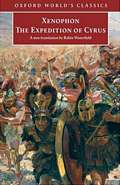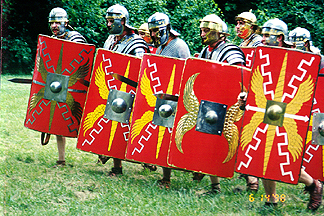
Introduction
Robin Waterfield is a famous author and translator who gains recognition for his vital and historical masterpieces. The collection of his own well-known works is widened by his new translation of Xenophon’s Anabasis. In this book he managed to show the true life of Greek and Persian soldiers, to outline the peculiarities of an ancient battle, and to describe the nature of historical and political events of the epic time. Xenophon, a writer, and a philosopher tried to bring the dangerous expedition to life using special approaches which characterized that time. Robin Waterfield turned the author of the story into the hero and reflected the truth of the events, pitfalls of power, and flow of the history in his personality.
Main body
The expedition of Cyrus is one of the most outstanding classical Greek texts highlighting the dangerous alien world. It describes the events of the ten thousand epic march, an army headed by a young prince of Persia Cyrus. He started the rebellion against his brother Artaxerxes II, the King of Persia, in 401 BC in order to wrest the throne and conquer the empire. Cyrus never hesitated as to the power of his brother and was sure that he would not have conquered the empire without a cruel battle. The story tells about the progress the army made from Sardis and up to Turkey, then from the Syrian Desert to the places of Mesopotamia.
The whole story consists of several books devoted to the particular events of the expedition. The first book reveals the detail of Cyrus’ death during the Cunaxa battle and at the hands of his brother leaving the army in the desert of Mesopotamia, a lot of thousands of miles from native places. Their long expedition described in other books of the story appeared to be one of the most thrilling, dangerous, and exciting adventures; the way the army made in order to see fringes of the Greek world was aimed at one common goal: to survive in the cruel ancient world. Obstacles met by the soldiers made readers feel and overcome all the emotions of that time.
Xenophon has featured a special role in this story as a member of the army and a leader of the feat of arms. When the generals of the Greek army were killed by the Persians at the conference, Xenophon burst with the desire to head the army and led the soldiers to the native places of the Greek world. The story opens the details of the soldiers’ inner fight inside the army; the necessity to establish discipline and elect the general. The author managed to describe the political and social life through the soldiers of the expedition. Xenophon was the embodiment of the real leader who can serve as a model of the ancient time; he headed the army in order to get through all the difficulties they met on their way. This character combines all the features which are necessary for strong-willed leadership: enthusiasm, initiative, organization skills as he was able to make the soldiers move even in a tired physical state.
The description of the army of the Ten Thousand presents an image of invincible power. The “Greekness” of the army is especially stressed by the author, and he also neglects the presence of females in the text. Women were mentioned only as prisoners and camp followers, but these facts and images are not significant from the author’s point of view. It was important and obligatory for the soldiers to be Greeks in order to gain respect on the part of others. The presentation of the army as a strong power of Greece had its own aim; the author strived to show the weak state of Persia. The image of the Ten Thousand helped to outline the possible invasion of Persia.

The war experienced and military skills of the Greek soldiers are stressed in many episodes; it is also illustrated when the members of the army refused to submit to the king’s demand who wanted them to hand over their weapons. This case shows the brave and fearless character of an ancient army that was ready to overcome any difficulties and obstacles in order to reach their goal and see native places. Self-confidence and independence of the army made Xenophon warn the whole group of the soldiers not to get in the chain of luxury and abide by their goal. He was afraid that they would get accustomed to another independent beautiful life with pretty women and a careless future; he could not forget their families and native Greece and wanted to prove to everyone that the poor life of his country could change for the better with the help of their resistance to all problems and temptations.
An ancient world of war and struggle, a world of will to victory and to survive whatever the cost makes it almost impossible to compare an ancient army with a modern one. The soldiers described in the book were ready to fight day by day, sword to sword as they bore responsibility not only for their lives but for the whole motherland, for the population which believed in them and supported them. One cannot see the embodiment of the modern army in the soldiers of the Ten Thousand; there are certain contradictions between the peculiarities of the ancient army and the modern one. Though the Ten Thousand were not a united power from the very beginning they strived for this aim due to the talented leader and a great wish to conquer the enemy. Nowadays young people do not have a strong desire to contribute a lot to the military situation of the country they live in, that is why the amount of soldiers is far fewer than in epic times of heroism and military achievements.
One more feature that causes contradictions between images of modern and ancient armies is the principle of leadership. This example is represented in the character of Xenophon who managed to keep control over the experienced soldiers during the whole expedition. Views and features of modern society differ a lot from those of former outstanding leaders and commanders; the question lies in goal differences of various generations. Though contemporary globalization and technical progress provided the whole world with dangerous weapons, we do not hurry to make use of it. This factor tells about the peace-loving character of modern people.
Conclusion
As a way of conclusion, one can express a real admiration by the book “Expedition of Cyrus” by Robin Waterfield. He managed to reflect the flow of events of the time before and after the rebellion; he highlighted the major aspects concerning the political situation of Greece and Persia and described the features of the resolute soldiers. Due to the story, it is easy to see the differences in times and views of two various epochs. This book is considered to be one of the most prominent historical stories reflecting the thrilling expedition of the great army of the Ten Thousand.
References
Xenophon, The Expedition of Cyrus. A new translation by Robin Waterfield.